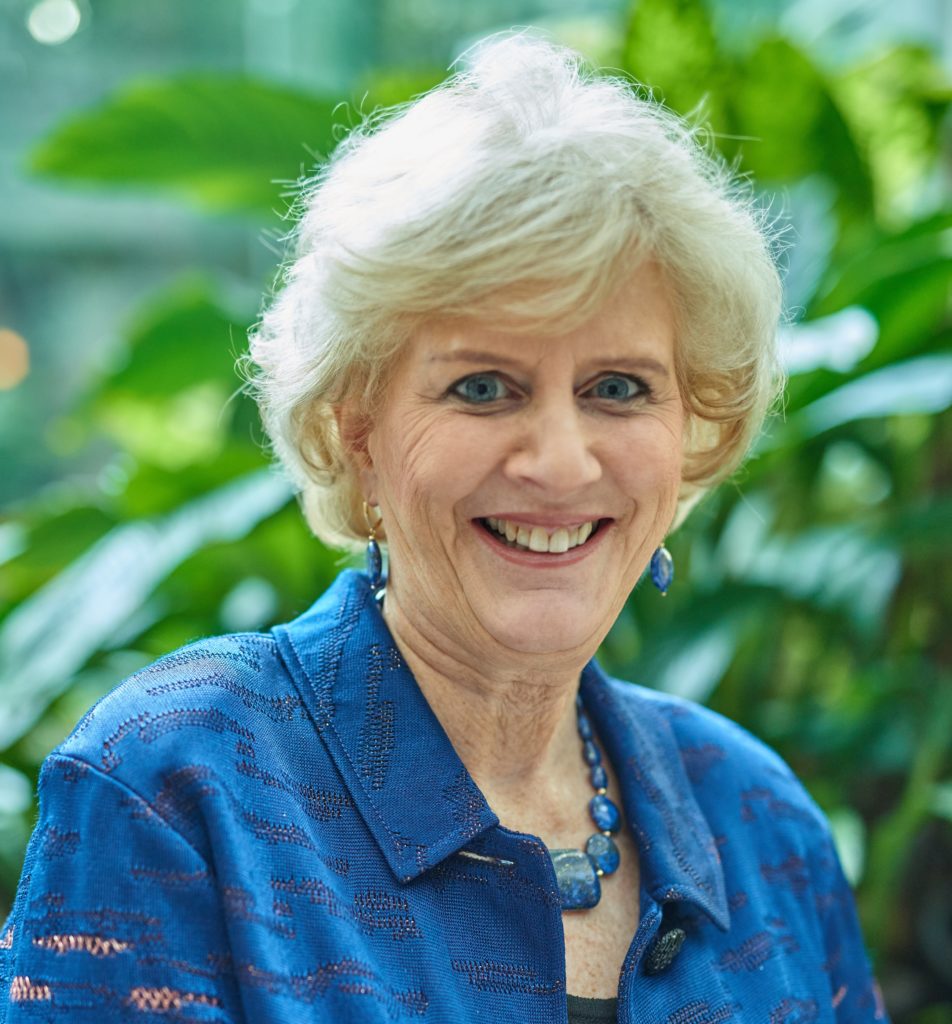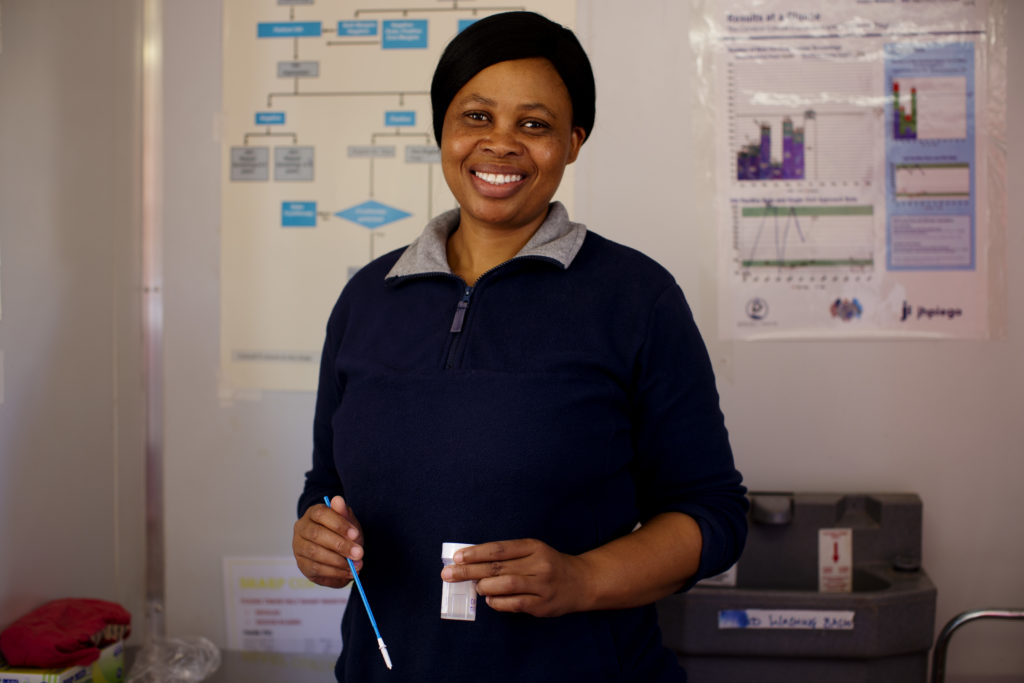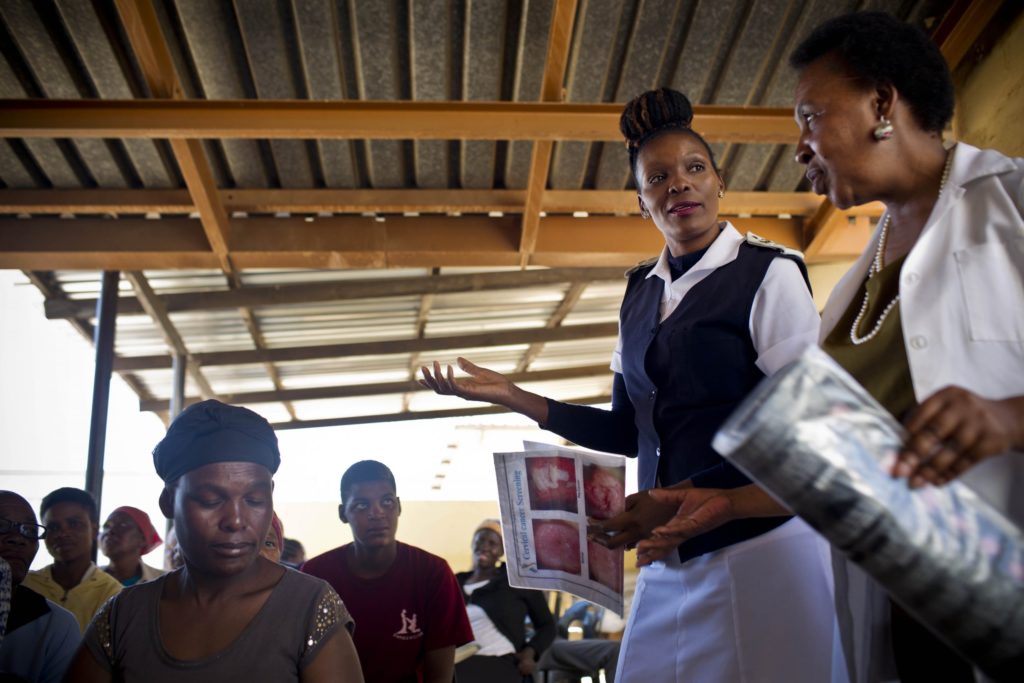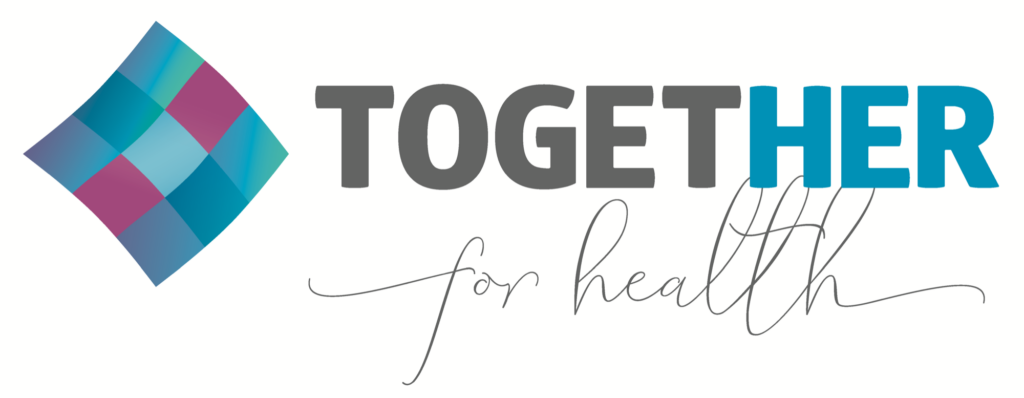The TogetHER Interview: Dr. Leslie Mancuso, Jhpiego President & CEO

-September 22, 2020
The impact of COVID-19 on global cervical cancer prevention efforts has been wide-ranging, with unclear long-term ramifications. Our new TogetHER Interview series provides an opportunity for key leaders in global cervical cancer control to discuss current challenges and provide perspective on where the field needs to go from here.
The first installment in our TogetHER Interview series features Jhpiego President & CEO Leslie Mancuso, who spoke to us during the 2020 UN General Assembly.
How have you and your organization been impacted by and adapted to COVID-19?
Nine months into the pandemic, COVID-19 touches Jhpiego’s work in nearly every country where we operate.
Many of our programs focus on supporting governments to provide high-quality primary care services by training and mentoring frontline healthcare workers. Once COVID-19 hit, we had to transition much of this work to virtual support. Many lifesaving program activities—including those related to cervical cancer services—have been interrupted due to enforced lockdowns and clients’ fear of seeking services during the pandemic. In response, Jhpiego accelerated safer ways of working, like telehealth and virtual mentorship, to keep reaching the world’s most vulnerable communities despite the added challenges of the virus.

“We’ve quickly adapted to a dual mission in our 40 countries: mitigating the effects of COVID-19 while ensuring essential health services continue.
Photo credit: Kate Holt/Jhpiego
We created a COVID-19 Task Force and developed guidance for business continuity and safety procedures. We implemented monitoring systems to track virus impact on our programs and staff and instituted COVID-19 focal points in each field office. Many in-country teams expanded their work to support government efforts to screen, test, contact trace, and manage/treat COVID-19 cases. More recently, we’ve been providing guidance for safely re-opening services and offices.
In short, we’ve quickly adapted to a dual mission in our 40 countries: mitigating the effects of COVID-19 while ensuring essential health services continue.
What concerns you most about women’s health in low-resource countries during the pandemic? What is your organization doing about it?
Jhpiego is deeply concerned with the reduction—or loss—of essential health services that we’ve seen in almost every country where we work. We’re also alarmed by the increase of gender and domestic violence against girls and women, and the lack of opportunity to identify, report and care for them to prevent HIV, STIs, and unwanted pregnancy. To combat these trends, we’re working tirelessly to advocate for the continuation of lifesaving services—including family planning, antenatal and postnatal care, cervical cancer prevention, ART and TB treatment—and to fill the gap where these services are not available.
This includes supporting alternative service delivery models that keep clients and providers safe: reorganizing clinic flow to allow for pre-triage, triage and separation; instituting appointment systems, where feasible, to decongest facilities; providing multiple months of treatment for PLHIV and contraceptive methods; introducing telemedicine for clinical consultation; and most importantly, promoting self-care and delivering services safely at clients’ homes.
Jhpiego has also been fundraising to purchase and deliver the personal protective equipment that keeps providers safe while they safeguard the health of at-risk communities.
How do you see cervical cancer prevention – the HPV vaccine and screen-and-treat – coming back after the pandemic? What can we do now to prepare for the resumption of services?
The good news is that programs are already adapting in promising ways to increase HPV vaccinations and cervical cancer screenings to pre-pandemic levels.
School closures forced vaccination programs to prioritize facility-based and community-outreach delivery of HPV vaccines—potentially cheaper channels that also offer new ways to reach adolescent girls. HPV vaccine delivery now also has a strong claim for inclusion in vaccine catch-up campaigns, which typically emphasize only measles or polio.

“The good news is that programs are already adapting in promising ways to increase HPV vaccinations and cervical cancer screenings to pre-pandemic levels.”
Photo credit: Kate Holt/Jhpiego
To resume cervical cancer screen-and-treat services, Jhpiego is supporting delivery models and measures that keep clients and healthcare workers safe. There is a very promising opportunity to expand access to HPV “self-sampling” testing, a method of screening where samples can be safely obtained by women anywhere, including at home, with results returned electronically or by phone. Of those that test positive for HPV, only a small number need to undergo a speculum examination for further management.
In all of this, the pandemic has forced programs to develop new messages and media for health communications that continue to encourage girls to receive HPV vaccinations wherever they’re offered. Additional innovation in demand generation is perhaps the most urgent and important task to help HPV vaccination programs bounce back.
What is something you have learned during COVID-19 that makes you hopeful?
I’ve learned many valuable lessons during this unprecedented time: the resilience of our staff and communities; the bonding effect of crisis; the great value and effectiveness of technology to support learning, mentorship and virtual service delivery.
What has given me hope is the remarkable spirit of collaboration between individuals and organizations throughout this crisis. Networks that existed prior to the onset of the pandemic have been strengthened, and new relationships have been forged to prevent, detect and respond to COVID-19. It’s true that often during the most difficult times, true friends reveal themselves.
Because this virus has magnified inequalities and exposed weaknesses, COVID-19 has also underscored that our work to strengthen health systems has never been more critical. Strong health systems are key to helping countries bounce back from this crisis—and ensure they’re better prepared to respond to future threats when they inevitably arise.
The new normal must be a landscape focused on resilient, community-driven health systems, and solutions that decentralize care. I’m hopeful because Jhpiego is primed to meet these needs by building the capacity of partner governments to create, together, the health systems of the future.
Interested in reading more TogetHER Interviews with leaders in the global cervical cancer response? Click here for the full list.

Dr. Leslie Mancuso is the President and CEO of Jhpiego. She is a recognized international business leader with 30+ years of experience in developing public-private partnerships with organizations such as the Bill & Melinda Gates Foundation, the US government, GE Foundation, Merck, Laerdal Medical, and ExxonMobil. Dr. Mancuso serves on numerous boards, including the Life Science Innovation Forum of the Asia Pacific Economic Cooperation Organization, and the Board of Directors of the World Trade Center Institute. For the US-ASEAN Business Council, Inc., she is both secretary of the board and a member of the board’s executive committee.
A nurse and American Academy of Nursing Fellow, Dr. Mancuso lends her expertise to the Advisory Council of the Johns Hopkins School of Nursing as well as Sigma Theta Tau International’s visionary Global Advisory Panel on the Future of Nursing & Midwifery. Dr. Mancuso has also been the recipient of many prestigious business and professional awards—including the Regional Ernst & Young Entrepreneur of the Year Award, the Smart CEO BRAVA Business Women Achievement Award, the Maryland International Business Leadership Award from the World Trade Center Institute, and the Baltimore Daily Record Innovator of the Year Award—and was inducted into the Maryland Chamber of Commerce Business Hall of Fame. Under her leadership, Jhpiego has received numerous high-profile awards including the 2014 United Nations Population Award as well as the 2014 CLASSY Award for Health, the Sigma Theta Tau International Archon Award, and a 2017 Webby Award. She holds a joint appointment at the Johns Hopkins University School of Nursing Department of Community-Public Health and is an Adjunct Professor at both the University of Technology in Sydney, Australia, and James Cook University in Cairns, Australia.
For more on Jhpiego’s global cervical cancer programs, click here.
